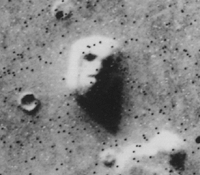| The Earth Has Many Faces |
| Written by David Conrad | |||
| Sunday, 02 June 2013 | |||
|
While others are spending time worrying about privacy issues associated with face recognition, generative design studio, Onformative, has created Google Faces, an algorithm-based agent, to search Google Maps’ satellite images for landscapes that resemble the human face. Yes, a search for the many faces of Earth. Berlin-based Onformative, founded by Julia Laub and Cedric Kiefer, both of whom studied communication design, onformative, founded by Julia Laub and Cedric Kiefer, describe what they do as being: At the intersection of technology, design and emotion we develop innovative, cross-media solutions for our customers in the domains of culture, economical and education. News of the Google Faces project was reported by Wired, one of Onformative's clients. The project is a collaboration between Onfromative and Christian "Mio" Locliar, a professional dancer and a computer scientist specializing in HCI (human computer interaction) and sets out to explore the psychological phenomenon of pareidolia, the tendency to detect meaning in vague visual stimuli: We were driven by the idea, to explore how the psychological phenomenon of Pareidolia, could be generated by a machine. We wrote an algorithm simulating this tendency, as it continuously searches for face-like shapes while iterating above the landscapes of the earth. As a major inspiration we took a look at the “Face on Mars” taken by Viking 1 on July 25, 1976. 
This video shows the algorithm in operation: Faces detected so far can be viewed on Onformative's Google Faces page and clicking on them opens Google Maps to show them in geographical context; You can try it with this sample which is in the Magadan Oblast area of Eastern Russia:
Detecting a face seems to be a pleasurable experience for humans, even when it can't be described as beautiful, and this project does appear to being art and technology together. I'll give the last word to Onformative: In our lab projects we are able to explore how new approaches in technology and design can be united. In such projects our goal is not necessarily to find solutions, but rather to approach subject matter in a playful and uninhibited manner, which results in innovative and unexpected products whose outcome is open and often even surprises us. More InformationRelated ArticlesFace Recognition Applied to Portraits Intel's Vision For 2013 - Perceptual Computing Free Face SDK For Windows Phone CV Dazzle - how to hide from face recognition
To be informed about new articles on I Programmer, install the I Programmer Toolbar, subscribe to the RSS feed, follow us on, Twitter, Facebook, Google+ or Linkedin, or sign up for our weekly newsletter.
Comments
or email your comment to: comments@i-programmer.info
|
|||
| Last Updated ( Sunday, 02 June 2013 ) |



